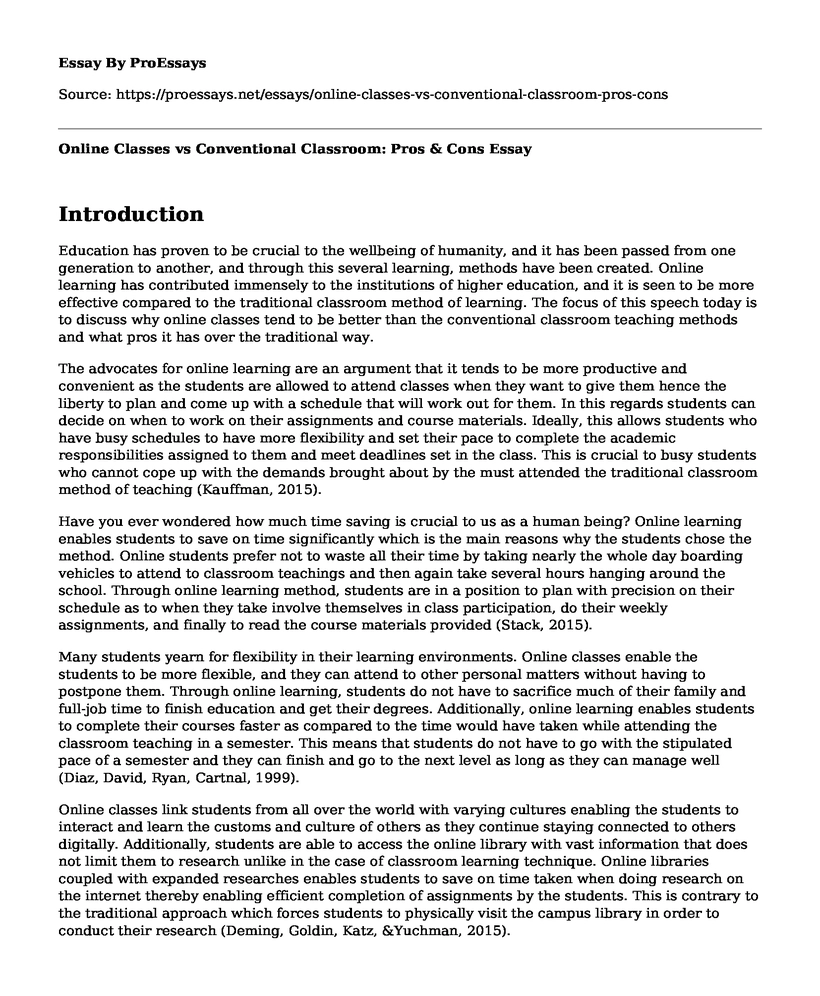Introduction
Education has proven to be crucial to the wellbeing of humanity, and it has been passed from one generation to another, and through this several learning, methods have been created. Online learning has contributed immensely to the institutions of higher education, and it is seen to be more effective compared to the traditional classroom method of learning. The focus of this speech today is to discuss why online classes tend to be better than the conventional classroom teaching methods and what pros it has over the traditional way.
The advocates for online learning are an argument that it tends to be more productive and convenient as the students are allowed to attend classes when they want to give them hence the liberty to plan and come up with a schedule that will work out for them. In this regards students can decide on when to work on their assignments and course materials. Ideally, this allows students who have busy schedules to have more flexibility and set their pace to complete the academic responsibilities assigned to them and meet deadlines set in the class. This is crucial to busy students who cannot cope up with the demands brought about by the must attended the traditional classroom method of teaching (Kauffman, 2015).
Have you ever wondered how much time saving is crucial to us as a human being? Online learning enables students to save on time significantly which is the main reasons why the students chose the method. Online students prefer not to waste all their time by taking nearly the whole day boarding vehicles to attend to classroom teachings and then again take several hours hanging around the school. Through online learning method, students are in a position to plan with precision on their schedule as to when they take involve themselves in class participation, do their weekly assignments, and finally to read the course materials provided (Stack, 2015).
Many students yearn for flexibility in their learning environments. Online classes enable the students to be more flexible, and they can attend to other personal matters without having to postpone them. Through online learning, students do not have to sacrifice much of their family and full-job time to finish education and get their degrees. Additionally, online learning enables students to complete their courses faster as compared to the time would have taken while attending the classroom teaching in a semester. This means that students do not have to go with the stipulated pace of a semester and they can finish and go to the next level as long as they can manage well (Diaz, David, Ryan, Cartnal, 1999).
Online classes link students from all over the world with varying cultures enabling the students to interact and learn the customs and culture of others as they continue staying connected to others digitally. Additionally, students are able to access the online library with vast information that does not limit them to research unlike in the case of classroom learning technique. Online libraries coupled with expanded researches enables students to save on time taken when doing research on the internet thereby enabling efficient completion of assignments by the students. This is contrary to the traditional approach which forces students to physically visit the campus library in order to conduct their research (Deming, Goldin, Katz, &Yuchman, 2015).
Comparatively, online learning enables students to log in to their accounts from anywhere meaning that they can undertake their lecture at any place without having to commute. This saves on both time is taken and the cost involved to do so. Besides online learning enables students to have access to a lot of colleges that offer courses that might not be on their local colleges (Stack, 2015).
Conclusion
In conclusion, online learning is better than the traditional classroom as a method of learning. It brings about huge benefits that are needed by many students in the quickly changing world, and this explains why many students prefer the process.
Works Cited
Deming, David J., Claudia, Goldin. Lawrence, Katz F., & Noam, Yuchman., "Can online learning bend the higher education cost curve?" American Economic Review 105.5 (2015): 496-501. Accessed from https://www.nber.org/papers/w20890.pdf
Diaz, David P., and Ryan B. Cartnal. "Students' learning styles in two classes: Online distance learning and equivalent on-campus." College teaching 47.4 (1999): 130-135. Accessed from https://pdfs.semanticscholar.org/e311/564a31698c10636b8d5d6182e7b392d87575.pdf
Kauffman, Heather. "A review of predictive factors of student success in and satisfaction with online learning." Research in Learning Technology 23 (2015). Accessed from http://repository.alt.ac.uk/2415/1/1648-7585-1-PB.pdf
Stack, Steven. "Learning outcomes in an online vs. traditional course." International Journal for the Scholarship of Teaching and Learning 9.1 (2015): 5. Accessed from https://digitalcommons.georgiasouthern.edu/cgi/viewcontent.cgi?article=1491&context=ij-sotl
Cite this page
Online Classes vs Conventional Classroom: Pros & Cons. (2023, Jan 04). Retrieved from https://proessays.net/essays/online-classes-vs-conventional-classroom-pros-cons
If you are the original author of this essay and no longer wish to have it published on the ProEssays website, please click below to request its removal:
- Essay on Children Education in Homeless Families
- Article Analysis Essay on Teachers, Social Media, and Free Speech
- Health-Related Education and Experience Paper Example
- Autobiography Essay Example: My Future Plans
- Essay Example on Unlock Literacy Skills With English Literature: A Must for Schools
- Reading: A Key Skill for English Learners in Saudi Arabia - Essay Sample
- Paper Example on Evolution of a Child's Attachment







